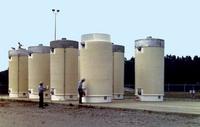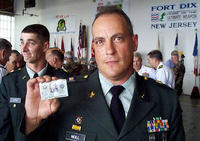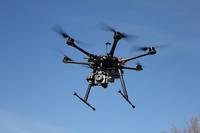-
NRC will not require nuclear plants to transfer waste to dry cask storage

Cooling pools on the grounds of U.S. nuclear plants, where toxic nuclear waste is stored, are near capacity, and in 2010 the plug was pulled on the Yucca Mountain centralized national nuclear waste repository, meaning that for the foreseeable future radioactive will continue to accumulate on site at the more than 100 nuclear power plants. Lawmakers called on the U.S. Nuclear Regulatory Commission (NRC) to require nuclear plants to hurry the transfer of spent fuel from the cooling pools to dry cask storage, which scientists consider much safer. The NRC, however, has decided that, at least for now, there is now reason to require nuclear plants to do so.
-
-
Scientists: immediate action required to address superbugs’ threat
Scientists warn that drug-resistant superbugs demand an immediate, serious response and that the steps required to plan for these pathogens were not properly taken in previous decades. “[A] world without effective antibiotics would be ‘deadly,’ with routine surgery, treatments for cancer and diabetes and organ transplants becoming impossible,” says one scientist. The scientists warn that if action is not taken immediately, the massive health gains made since Alexander Fleming’s discovery of penicillin in 1928 will be lost forever.
-
-
Canada donates Biosafety Level 3 modular laboratory to Caribbean health authorities
The Biological Security program of Canada’s Global Partnership Program(GPP) has officially transferred a new biological containment laboratory to the Caribbean Public Health Agency(CARPHA). The Biosafety Level 3 (BSL-3) modular laboratory facility, a first in the Caribbean and located in Port of Spain, Trinidad and Tobago, improves diagnostic capabilities for human and veterinary pathogens with high epidemic potential.
-
-
Rio builds a high tech integrated urban command center

Rio de Janeiro is one of the most densely populated cities in South America. Much of the city is vulnerable to flooding, and about three-quarters of Rio’s districts have areas at risk of landslides. High temperatures can make living situations unbearable. In addition, a high crime rate and poor infrastructure make the city difficult to govern. In preparation for the 2014 World Cup and 2016 Summer Olympics, authorities are looking to improve response times to disasters and establish a more efficient system to deal with the city’s many challenges. One of the solutions is a high tech integrated urban command center — Centro de Operações Preifetura do Rio de Janeiro (COR) – which unites Rio’s thirty departments and some private suppliers in a single monitoring room where operators can track real-time conditions of the city and coordinate a response to emergencies and disruptions.
-
-
U.S. govt. the largest employer of undocumented immigrants
At least 60,000 undocumented immigrants have worked at federal detention centers while waiting for an immigration court to hear their case. While detained, many immigrants work as cooks and janitors at federal and privately-run detention centers, often making less than $1 a day. The cheap labor saves the federal government and private companies at least $40 million a year by making it unnecessary to pay outside contractors the $7.25 federal minimum wage. Since about half of all immigrants in immigration court typically win their case, this means that that tens of thousands of legal immigrants are working for less than a dollar a day in immigration detention facilities.
-
-
Scientists urge U.S. to do more to detect, prevent use of bioweapons
Carefully targeted biological weapons could be as dangerous as nuclear weapons, so the United States should invest more resources in developing technologies to detect them, scientists say. What is especially worrisome is that “The advent of modern molecular genetic technologies is making it increasingly feasible to engineer bioweapons,” says one expert. “It’s making people with even moderate skills able to create threats they couldn’t before.” There is another worry: “A high-tech bioweapon could cost only $1 million to build,” the expert adds. “That’s thousands of times cheaper than going nuclear. Iran’s centrifuges alone cost them billions.”
-
-
Preventing ethnic violence: Full integration or full separation
What if we could use science to understand, accurately predict, and ultimately avoid, ethnic violence? A new study argues that the key to peace is either completely to integrate or completely separate people based on cultural, linguistic, and ethnic differences.
-
-
U.S. recalibrating Secure Communities
The number of municipalities cooperating with Secure Communities has grown from fourteen in 2008 to more than 3,000 today, and about 283,000 immigrants have been deported under the program between 2008 and April of this year. More and more municipalities, however, refuse to hold undocumented immigrants in jail on behalf of Secure Communities.DHS chief Jeh Johnsonsays Secure Communities needs a “fresh start,”and President Barack Obama is planning to limit deportations to undocumented immigrants who have been convicted of violent crimes.
-
-
Impasse over abducted girls as Nigeria admits it has no military option

Military and intelligence personnel from France, the United States, Israel, and Britain have been in Abuja and in the field for three weeks now, in an effort to help the Nigerian military develop a plan to deal with the plight of the more than 200 abducted girls. After three weeks in Nigeria, these Western diplomats, and military and intelligence officials, concede that the Nigerian military and government are just not up to the task. “There is a view among diplomats here and with their governments at home that the [Nigerian] military is so poorly trained and armed, and so riddled with corruption, that not only is it incapable of finding the girls, it is also losing the broader fight against Boko Haram,” the New York Times reported. The paper continued: “That the hope of many across the globe [for the safe return of the girls] rests on such a weak reed as the Nigerian military has left diplomats here [in Abuja] in something of a quandary about the way forward. The Nigerian armed forces must be helped, they say, but are those forces so enfeebled that any assistance can only be of limited value?”
-
-
Port security technologies demonstrated in Gothenburg, Sweden
FOI, the Swedish Defense Research Agency, conducted a demonstration in Gothenburg of technology designed to improve the security of ports around the world. One of the reasons for the research into countering intrusion is that many ports find that they lack good and affordable tools for seaward surveillance, and so find it difficult to guard against terrorist attack and organized crime such as theft, smuggling, and stowaways. FOI has, therefore, created a system that is capable of detecting divers, swimmers, or small craft which might attempt to approach the quayside or a vessel tied up alongside.
-
-
Server outages continue to hobble immigration courts’ work
The servers of the U.S. Executive Office for Immigration Review (EOIR)support the fifty-nine immigration courts administered by the EOIR,the electronic registry for accredited immigration attorneys and representatives, and the 260-plus immigration court judges and staff. For the last six weeks, these servers have suffered from severe outages, hobbling the work of the immigration courts. During the six week period, about 366,724 cases were pending, butcourt clerks were unable to access court records, enter new records in the system, and make digital recordings of hearings.
-
-
A bill offers a military path to citizenship for Dreamers

The Enlist Act,authored by Representative Jeff Denham (R-California) would allow immigrants who were brought to the United States illegally before 2012 and below the age of fifteen at the time (Dreamers) to enlist in the military, earning them permanent legal status, and upon honorable discharge, eligibility for U.S. citizenship. Denham and his co-sponsors tried to get the proposal though the National Defense Authorization Act(NDAA), a bill likely to pass, but House leaders rejected the idea.
-
-
DHS HQ: Doubts grow about trouble-plagued St. Elizabeths complex

DHS was supposed to move into its new, centralized headquarters on the grounds of the historic St. Elizabeths, in 2015, at a cost estimated to be about $3 billion. Today the project is $1.5 billion over budget, eleven years behind schedule, with thousands of DHS employees working at more than fifty scattered, expensively leased office buildings. Some lawmakers doubt whether the complex will ever be completed. A congressional aide familiar with sentiments on the Hill says: “It’s [the original St. Elizabeths complex plan] just not going to happen. The money doesn’t exist.”
-
-
Public-private partnership proposed to fund Calif. seismic early warning system
California state agencies federal agencies, are proposing a partnership between public and private agencies to build the $23.1 million earthquake early warning system in the state, and fund the $11.4 million annual operating budget. Governor Jerry Brown signed Senate Bill 135 in 2013 authorizing construction of the warning system, but the bill does not provide or allocate funding, despite a plan to have the system active in two years. The early warning system will provide Los Angeles residents up to a minute’s notice if a large earthquake is generated on the San Andreas Fault in the Salton Sea area. The system could also provide warnings for earthquakes that occur throughout California’s earthquake-prone landscape.
-
-
Drone surveillance raises legal, ethical concerns

The use of drones for domestic security purposes, surveillance of citizens, and putative criminals and organizations raises many legal and ethical concerns particularly with regard to the Fourth Amendment to the U.S. Constitution, Council of Europe instruments, and the EU Data Protection Framework. Experts suggest that the rise of drones for surveillance and other applications highlights particular challenges to civil liberties and tensions between these and national security and justice concerns.
-
More headlines
The long view
Preventing Another 'Jan. 6' Starts by Changing How Elections Are Certified, Experts Say
The 2024 presidential election may be a rematch between President Joe Biden and former President Donald Trump, but preventing a repeat of Jan. 6, 2021 — when false claims of a stolen election promoted by Donald Trump and his allies led to an insurrection at the U.S. Capitol —will be top of mind this election year. Research finds broad support among public for nonpartisan certification commissions.
States Rush to Combat AI Threat to Elections
This year’s presidential election will be the first since generative AI became widely available. That’s raising fears that millions of voters could be deceived by a barrage of political deepfakes. Congress has done little to address the issue, but states are moving aggressively to respond — though questions remain about how effective any new measures to combat AI-created disinformation will be.
Chinese Government Hackers Targeted Critics of China, U.S. Businesses and Politicians
An indictment was unsealed Monday charging seven nationals of the People’s Republic of China (PRC) with conspiracy to commit computer intrusions and conspiracy to commit wire fraud for their involvement in a PRC-based hacking group that spent approximately 14 years targeting U.S. and foreign critics, businesses, and political officials in furtherance of the PRC’s economic espionage and foreign intelligence objectives.
European Arms Imports Nearly Double, U.S. and French Exports Rise, and Russian Exports Fall Sharply
States in Europe almost doubled their imports of major arms (+94 per cent) between 2014–18 and 2019–23. The United States increased its arms exports by 17 per cent between 2014–18 and 2019–23, while Russia’s arms exports halved. Russia was for the first time the third largest arms exporter, falling just behind France.
LNG Exports Have Had No Impact on Domestic Energy Costs: Analysis
U.S. liquified natural gas (LNG) exports have not had any sustained and significant direct impact on U.S. natural gas prices and have, in fact, spurred production and productivity gains, which contribute to downward pressure on domestic prices.
